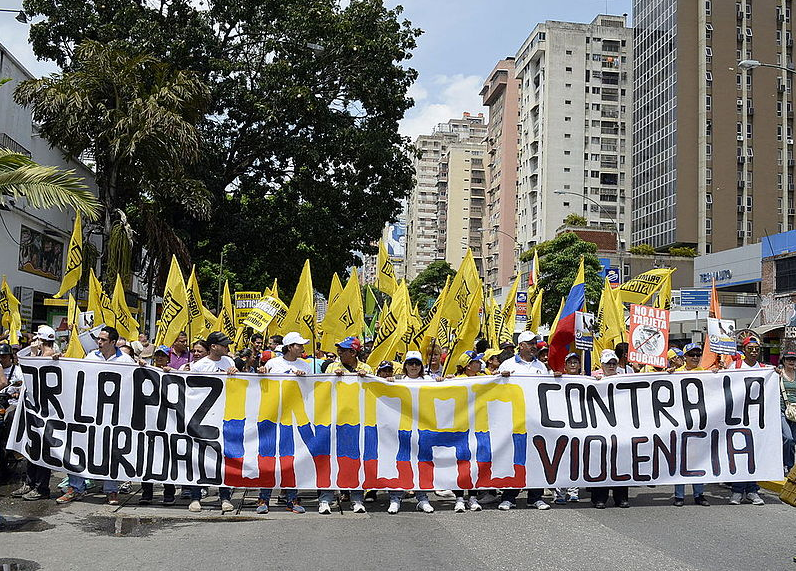Government corruption in Venezuela leads to social unrest, protests
Courtesy of Wikimedia Commons
Protesters at an October 2014 demonstration in Venezuela carry yellow flags and a sign. Plummeting oil prices caused Venezuela’s economy to crash, resulting in high inflation, a lack of basic necessities and an increased crime rate.
September 6, 2017
The economic crisis has been exacerbated by the current administration’s institution of a constituent assembly, reminiscent of the Supreme Court’s move to overtake the opposition-controlled National Assembly. Protestors complain of political corruption and government mismanagement.
The Venezuelan government’s corruption and worsening economic conditions have incited many protests this year and since the start of Hugo Chavez’s rule in 2012.
During Chavez’s presidency, the government went over their budget and was completely dependent on oil revenues. Venezuela now has $10 billion in reserves, compared to the $30 billion in 2011.
Since 2006, Venezuela’s oil output has dropped by almost 1 million barrels a day, according to the International Energy Agency.
Plummeting oil prices caused Venezuela’s economy to crash, resulting in high inflation, a lack of basic necessities and an increased crime rate.
“The basic problem in Venezuela is the same problem that affects humans all around the word, and it involves two things. One is greed and the other is power,” Jeffrey Sheehan, former International Relations associate dean at the Wharton School at the University of Pennsylvania, said. “In the case of Venezuela, what kicked it off was petroleum. Before petroleum, Venezuela was a pretty obscure country, and when they discovered oil, suddenly it became wealthier. As often happens when oil is discovered in a country, only a very small percent of the population benefits from it, and that’s part of the power and greed.”
Chavez continued to promise impoverished citizens wealth. Soon, shortages of food and water prompted Venezuelan citizens to respond with protests.
“[Venezuelans] are protesting because they have no food or money and because they are living in extreme poverty with no work prospects. They are protesting because they want a government that works, and is not corrupt,” Venezuelan citizen Karina Tate said. “They want a country where they can work and better themselves and have money to eat and live.”
Currently living in the U.S., Tate departed from her home country 20 years before the rule of Chavez.
“It wasn’t anywhere as bad as it is now. When I lived there, I thought it was the most beautiful country in the world. Its beaches, mountains, little quaint towns,” Tate said. “I blame Chavez and the current government for marking Venezuela what it is today.”
Citizens stood on the streets of Venezuela’s capital, Caracas, in mid-July, reacting to a delegate election proposed by current president Nicholas Maduro in order to rewrite the Venezuelan Constitution.
“On July 16, millions of Venezuelans overwhelmingly expressed—in a loud and clear voice—their rejection of a National Constituent Assembly designed to weaken democracy in Venezuela,” U.S. Department of State spokesperson Heather Hauret said in a press release. “Nearly 234 years to the day after the birth of Simon Bolivar, who fought for the freedom of the people of Venezuela, President Nicolas Maduro has cast aside the voices and aspirations of the Venezuelan people.”
Protesting government corruption, a group designed in military uniform attempted to attack an army base near the city of Valencia on Aug. 6.
Five days later, President Trump mentioned potential United States military intervention in Venezuela.
“Most recently, I saw what appeared an effort to overthrow the government through a group of the military who were opposed to the president and tried to organize what seemed to be a coup d’etat,” Sheehan said.
This piece was originally published in the pages of the Winged Post on September 6, 2017.




![LALC Vice President of External Affairs Raeanne Li (11) explains the International Phonetic Alphabet to attendees. "We decided to have more fun topics this year instead of just talking about the same things every year so our older members can also [enjoy],” Raeanne said.](https://harkeraquila.com/wp-content/uploads/2025/10/DSC_4627-1200x795.jpg)


















![“[Building nerf blasters] became this outlet of creativity for me that hasn't been matched by anything else. The process [of] making a build complete to your desire is such a painstakingly difficult process, but I've had to learn from [the skills needed from] soldering to proper painting. There's so many different options for everything, if you think about it, it exists. The best part is [that] if it doesn't exist, you can build it yourself," Ishaan Parate said.](https://harkeraquila.com/wp-content/uploads/2022/08/DSC_8149-900x604.jpg)




![“When I came into high school, I was ready to be a follower. But DECA was a game changer for me. It helped me overcome my fear of public speaking, and it's played such a major role in who I've become today. To be able to successfully lead a chapter of 150 students, an officer team and be one of the upperclassmen I once really admired is something I'm [really] proud of,” Anvitha Tummala ('21) said.](https://harkeraquila.com/wp-content/uploads/2021/07/Screen-Shot-2021-07-25-at-9.50.05-AM-900x594.png)







![“I think getting up in the morning and having a sense of purpose [is exciting]. I think without a certain amount of drive, life is kind of obsolete and mundane, and I think having that every single day is what makes each day unique and kind of makes life exciting,” Neymika Jain (12) said.](https://harkeraquila.com/wp-content/uploads/2017/06/Screen-Shot-2017-06-03-at-4.54.16-PM.png)








![“My slogan is ‘slow feet, don’t eat, and I’m hungry.’ You need to run fast to get where you are–you aren't going to get those championships if you aren't fast,” Angel Cervantes (12) said. “I want to do well in school on my tests and in track and win championships for my team. I live by that, [and] I can do that anywhere: in the classroom or on the field.”](https://harkeraquila.com/wp-content/uploads/2018/06/DSC5146-900x601.jpg)
![“[Volleyball has] taught me how to fall correctly, and another thing it taught is that you don’t have to be the best at something to be good at it. If you just hit the ball in a smart way, then it still scores points and you’re good at it. You could be a background player and still make a much bigger impact on the team than you would think,” Anya Gert (’20) said.](https://harkeraquila.com/wp-content/uploads/2020/06/AnnaGert_JinTuan_HoHPhotoEdited-600x900.jpeg)

![“I'm not nearly there yet, but [my confidence has] definitely been getting better since I was pretty shy and timid coming into Harker my freshman year. I know that there's a lot of people that are really confident in what they do, and I really admire them. Everyone's so driven and that has really pushed me to kind of try to find my own place in high school and be more confident,” Alyssa Huang (’20) said.](https://harkeraquila.com/wp-content/uploads/2020/06/AlyssaHuang_EmilyChen_HoHPhoto-900x749.jpeg)











